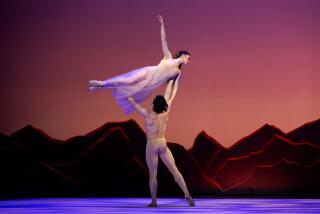Review: ‘The White Crow’ is a classic look at volcanic dancer Rudolf Nureyev
Subject and style could not be more different than in “The White Crow,” but that fusion of opposites has resulted in an involving biographical drama that rarely puts a foot wrong.
Speaking of feet, the subject is Rudolf Nureyev, a dancer to conjure with, a superstar/sacred monster who changed the very nature of ballet, the first major Soviet artist to defect to the West and a man who had, a biographer wrote, “an innate sense that borders were meant to be crossed.”
Nureyev’s highly dramatic, unexpected story has been brought to the screen in an impeccably classic way by actor Ralph Fiennes, who directs as well as costars, and David Hare, a writer with dozens of plays and scripts to his credit.
More than that, great care has been taken to stick closely to the facts of Nureyev’s passion-driven life, especially the film’s climactic moments, the dancer’s impulsive but finally inevitable 1961 decision to defect to the West in the departure lounge of a Paris airport.
Fiennes, whose previous forays into directing and acting include the sterling “The Invisible Woman,” has been wanting for some 20 years to make a film on this “ferocious, difficult and contradictory man.”
Sticking to the facts also means having most of the cast, including Fiennes himself, speaking Russian, and taking the risk of casting Oleg Ivenko, a top Ukrainian dancer who has something of Nureyev’s look but had never acted before, as the man himself.
As structured by Hare, “White Crow” (named after a Russian idiom for someone who is not like other people) alternates between three different periods in the dancer’s life.
These include his impoverished childhood in the central Russian city of Ufa (following his birth on the Trans-Siberian Railway, of all places), his days as a ballet student in Leningrad, and the trip to Paris with the Kirov (now the Mariinsky) Ballet that led to his defection.
“White Crow” begins at the end of the story, with a coda after Nureyev’s defection, when a KGB official grills Alexander Pushkin (Fiennes), the dancer’s teacher and mentor, about why he left.
No, Pushkin quietly insists, Nureyev’s leaving was not an attack on the Soviet Union, in fact it had nothing to do with politics at all.
“It’s about dance,” Pushkin says, adding, “it was an explosion of character.” How exactly that character came to be formed is what the rest of “White Crow” is about.
We first see Nureyev on an Aeroflot plane taking him to Paris in spring 1961, excited to be part of the Kirov’s first trip to the West since the end of World War II and filled with a hunger for experiences of any and all kinds.
Passionate about every art, not just dance, Nureyev goes to the Louvre to see Gericault’s “The Raft of the Medusa,” a personal favorite, but also makes time (this apparently really happened) to buy a toy train set.
Attracted to both sexes and hungry for personal experience, Nureyev makes a point of hanging out with French dancers, and it’s through them that he meets Clara Saint (Adele Exarchopoulos), a young woman dealing with a personal tragedy whom he forms a strong bond with.
None of this is lost on the Soviet KGB minders, led by the ever-vigilant Strizhevksy (Aleksey Morozov), who track the dancer’s every move and try to balance sympathy for a great artist with belief in the rules.
In truth, Nureyev can be difficult to sympathize with, even for his friends. Self-confident past the point of arrogance (“It’s not going to take long until everybody knows who I am”), he is also sensitive, easily offended and possessed of a terrible temper.
Those flashbacks, starting with a father who was often absent during his hardscrabble childhood, make us see the astronomical odds Nureyev had to overcome to succeed.
Aware of beginning way late starting at the Leningrad Choreographic School (“I need to do six years work in three”), he alienates some of the faculty with his intensity and hauteur.
But he finds a champion when Pushkin takes him under his wing and teaches him that “steps have a logic” and “technique is only a means, not an end.” Not on the curriculum but increasingly a factor is the attention that Pushkin’s wife Xenia (Chulpan Khamatova) pays to her husband’s protégé.
One of the paradoxes of Nureyev’s accurately portrayed airport defection is that it was completely spur of the moment and a result of KGB tactics. “I would never have had the courage to do it,” he told a friend years later, “unless they goaded me.” But he did, and the convincing “White Crow” makes us understand how and why it happened.
-------------
‘The White Crow’
In English and Russian with English subtitles
Rated: R, for some sexuality, graphic nudity and language
Running time: 2 hours, 7 minutes
Playing: Starts April 26, Arclight, Hollywood; Landmark, West Los Angeles
More to Read
Only good movies
Get the Indie Focus newsletter, Mark Olsen's weekly guide to the world of cinema.
You may occasionally receive promotional content from the Los Angeles Times.










